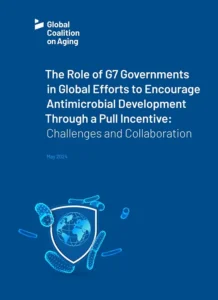 At the meeting and in the report that followed, “The Role of G7 Governments in Global Efforts to Encourage Antimicrobial Development Through a Pull Incentive: Challenges and Collaboration,” leaders called on G7 governments to fund pull incentives and make “fair share” investments in antibiotic innovation to fight the global antimicrobial resistance (AMR) crisis.
At the meeting and in the report that followed, “The Role of G7 Governments in Global Efforts to Encourage Antimicrobial Development Through a Pull Incentive: Challenges and Collaboration,” leaders called on G7 governments to fund pull incentives and make “fair share” investments in antibiotic innovation to fight the global antimicrobial resistance (AMR) crisis.
They found that:
- The lack of new antimicrobials and increasing resistance against existing antimicrobials has a severe impact on those most at-risk of infection.Older antibiotics are growing less effective due to increasing AMR, and new development is nearly at a halt, meaning that for millions, options are running out.
- The current state of the antimicrobial pipeline is inadequate against growing AMR and must be prioritized.Currently, there are few antimicrobial candidates that meet the World Health Organization (WHO) innovation criteria targeting priority pathogens.
- Incentive structures to develop new antimicrobials must be supported, with consideration to globally equitable access to products once they reach the market. The UK is currently the only country with a fully functional pull incentive. Other countries must rise to the challenge and complement the UK system with their own incentives.
- Global collaboration and attention to countries’ “fair share,” based on GDP, is an imperative to tackle AMR. The G7 and EU together can shoulder the burden to make a solution possible, and the more countries involved means that the collective whole will be greater than the sum of its parts.
In September, countries will gather for the 2024 UNGA High-Level Meeting on AMR, where they have the opportunity to put the findings of this report into place.
The roundtable and report, available in both English and Japanese, were funded by the Japanese Pharmaceutical Manufacturer’s Association (JPMA).
 Global Coalition On
Global Coalition On